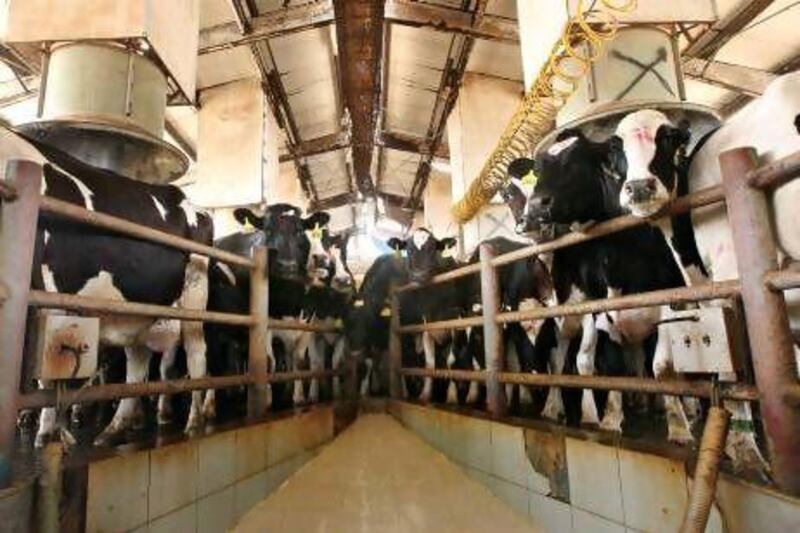ABU DHABI // Dairy companies are adding widely varying amounts of vitamin D to their milk in the absence of a clear Government directive on what they should do.
The levels range from zero to 400IU (international units) per litre. The US Institute of Medicine's recommended daily allowance of vitamin D is 600IU.
Ninety per cent of vitamin D is normally obtained from direct exposure to the sun's ultraviolet rays, but this is not practicable in hot countries such as the UAE. As a result, up to 65 per cent of the population is deficient in the vitamin.
Lack of vitamin D has been linked to multiple sclerosis and bone diseases such as osteoporosis, as well as cancer, hypertension, dementia, diabetes, arthritis, tooth decay and cardiovascular diseases.
Two of the UAE's three biggest dairy companies supplement their products with vitamin D, but the amounts vary enormously. Experts called yesterday for a properly regulated process with federal standards that all dairies would be required to follow.
"The authorities should make a clear fortification policy," said Mohammed Hassan Haj, quality assurance and product development manager of Al Rawabi Dairy.
His company adds 400IU per litre to its milk products, as recommended by the GCC Standardisation Organisation in Saudi Arabia.
Al Ain Dairy said it followed the Abu Dhabi Food Control Authority's guidelines by adding 40iu, but the authority said regulating Vitamin D was not in its jurisdiction.
Abdullah Saif Al Darmaki, chief executive of Al Ain Dairy, said it was "up to the individual dairy manufacturer whether they choose to fortify their products or not.
"We consider the health benefits associated with adding Vitamin D and think it is an essential addition to our milk products for the long-term health benefits of our consumers."
Gulf & Safa Dairies does not fortify any of its products and did not return a request for a comment.
A 2007 study of 54 samples of milk products by a team of scientists from United Arab Emirates University found that 39 per cent contained vitamin D within an acceptable range, 31 per cent were under-fortified and 30 per cent were over-fortified.
Dubai Municipality's Food Control Department checks milk only for fat content, protein and acidity levels, not for vitamin fortification levels.
The department's senior manager for food standard and food safety systems, Dr Bahaa Mustafa, said he was under the impression that "all factories add the vitamin", but said "nobody checks to analyse if the levels are correct".
He said the municipality "hopes to start a collaboration" with the Ministry of Health and the Ministry of Water and Environment to create a policy.
"We should look at the international recommendation and make it mandatory here," he said. "Spending time in the sun is important, but children stay at home because the weather is very hot." The Undersecretary at the Ministry of Health, Mahmoud Fikiry, said creating a policy on fortification was "not their jurisdiction".
An official government study on Vitamin D deficiency should be conducted before a potential policy could be considered, he said. "There should be an official report from the Government. We will do a proper study when we feel it is important."
The Vitamin D fortification debate has reignited in countries such as Australia, where government health officials and scientists reviewed a proposal last month to make fortified milk compulsory after a third of the population was found to be Vitamin D deficient.
In December last year, experts in Scotland called for a public fortification policy in an attempt to tackle multiple sclerosis.
Rickets was almost completely eliminated by the 1970s after the US and Canada began fortifying milk products in the 1930s.
According to a 2007 survey of 260 food products with added vitamins and minerals conducted by the UK's Food Commission, 75 per cent of consumers felt that fortification should be allowed "provided it presents no risk to health".
However, the debate has raised concern among some food experts about the risks of overdose.
Excessive exposure to the sun does not result in Vitamin D toxicity, but too much of the vitamin supplement can raise calcium levels in the blood, which leads to vascular and tissue calcification and damage to the heart and kidneys.
molson@thenational.ae






